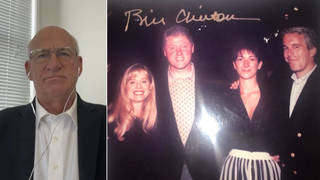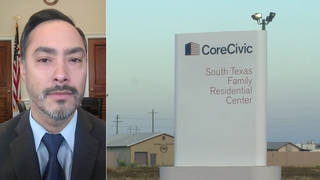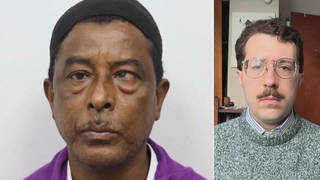
Topics
Guests
- Trey Martinez FischerDemocratic Texas state representative for House District 116 in San Antonio.
- David Daleyauthor and senior fellow at FairVote.
Democrats and Republicans are locked in a historic battle over congressional representation as Texas Republicans gerrymander the state’s district maps to flip five Democratic seats, at the request of President Trump. California Governor Gavin Newsom says he is fighting “fire with fire,” signing legislation to hold special elections for the public to approve a new gerrymandered map of their own. David Daley, a voting rights expert and the author of Antidemocratic: Inside the Far Right’s 50-Year Plot to Control American Elections, calls this a “gerrymandering Armageddon” that threatens to spread nationwide. “Donald Trump does not want to have an election fair and square,” says Texas state legislator Trey Martinez Fischer, a Democrat representing San Antonio. “He wants to be the 'commander-in-cheat.' He wants to cheat on America, cheat on democracy, steal these congressional seats.”
Transcript
AMY GOODMAN: California Governor Gavin Newsom signed legislation Thursday approving a special election in November that will ask voters to approve a new, partisan congressional map favoring Democrats. Lawmakers in Sacramento approved the measures a day after Texas’s Republican-controlled House passed a new congressional district map designed to flip five Democratic-held U.S. House seats in the 2026 midterm elections. This rare instance of mid-decade redistricting came at the behest of President Trump. California Governor Gavin Newsom spoke Thursday.
GOV. GAVIN NEWSOM: We got here because the president of the United States is struggling. We got here because the president of the United States is one of the most unpopular presidents in U.S. history. We got here because he recognizes that he will lose the election. Congress will go back into the hands of the Democratic Party next November. We got here because of his failed policies. Those are being exposed hour by hour, reinforced today by Walmart announcing they’ll be raising prices because of the tax increases, because of the tariffs, reminded every day by a slowing economy, growing mistrust, distrust all across this nation. Across the board, he is failing. He recognized that, and that’s why he made a phone call to Greg Abbott asking for five seats — can’t win by playing by traditional sets of rules. He plays by no rules. I remind you all the time: It’s not the rule of law, it’s the rule of Don. And we’re standing up to that.
AMY GOODMAN: We’re joined now by two guests. Trey Martinez Fischer is a Democratic Texas state representative from San Antonio. His piece for the San Antonio Express-News is headlined “To preserve democracy, Texas Democrats must fight fire with fire.” Earlier this month, he and other Texas Democratic lawmakers fled the state in an attempt to block passage of the new, gerrymandered congressional maps. He’s joining us from Austin.
And in Haydenville, Massachusetts, David Daley is with us, a senior fellow at FairVote, author of several books on voting, including Antidemocratic: Inside the Far Right’s 50-Year Plot to Control American Elections and Unrigged: How Americans Are Battling Back to Save Democracy.
Let’s go first to Austin to speak with Trey Martinez Fischer. Explain what has taken place, what is taking place as we speak, in the Texas Legislature, why you fled the state to break quorum, but the fact that now the vote, one of the votes, has taken place to pass the GOP-favored gerrymandered map.
REP. TREY MARTINEZ FISCHER: No, well, thank you for the question. Well, first, it was one of the — just historic bait and switch. As you know, in Texas, we had a horrific flood where many people lost their lives. Many lives were just upended. And the idea was, we were going to come to a special session to aid the flood relief victims, to try to make things whole. And in just really with a snap of a finger, the governor announces his intention to have a mid-decade redistricting to bring five new Republican seats in Congress, which really threw everybody off.
We knew from the start that we did not have the votes to stop that. And moreover, we didn’t think the country was paying attention to what was happening in Texas. So, my fellow Democrats and I, we decided to elevate this conversation, fight in the national arena, leave the state of Texas for over two weeks, you know, find refuge in Illinois under the leadership and watch Governor Pritzker. And we used our two weeks to rally the country, to wake people up and to let people know that Donald Trump does not want to have an election fair and square, that he wants to be the “commander-in-cheat.” He wants to cheat on America, cheat on democracy, steal these congressional seats.
And I’m just thankful that other leaders woke up, saw what was going on, and said, “OK, if Trump is going to throw out the rule book, then we will fight fire with fire.” And I think that’s what you see in California.
AMY GOODMAN: Did California have to do with you coming back to Texas, even though you knew that meant that they would pass the gerrymandered map?
REP. TREY MARTINEZ FISCHER: I think what it meant is, again, you know, had we stayed in Austin and we fought this in the middle of the night, it might have made the local news. We know this is now international news. We know that people are starting to ask questions about mid-decade redistricting and gerrymandering and all of the stuff that is happening.
And quite frankly, if you ask California leaders, they needed time to educate their voters, to educate their lawmakers. They needed a discussion to be on the national stage. And I think, as you saw very recently, that a poll in the state of California showed 57% of Californians agree with Governor Newsom’s plan to draw five new congressional seats in California. That doesn’t happen by osmosis. That happens by engagement and people coming together and this country rallying, because, look, I never underestimate the power of the American people when it comes to preserving and protecting our democracy.
AMY GOODMAN: Representative Martinez Fischer, you’re serving your 12th term in the Texas House of Representatives. You’re the former chair of the House Democratic Caucus and the Mexican American Legislative Caucus. Talk about how partisan gerrymandering relates to racial gerrymandering.
REP. TREY MARTINEZ FISCHER: Thank you very much for the question, because that is the heart of the matter here. You know, Republicans and Donald Trump and Governor Abbott will tell you, “Well, this is nothing new here. This is just — we’re looking for partisan performance, and that is entirely legal.” Well, yes, you can draw maps for partisan performance, but you can’t do it on the backs of the minority community.
Here’s what the maps in Texas do and how minority rights are taken away. Number one, you take districts in Texas, congressional districts like, you know, the one represented by Representative Al Green. That district is a performing district right now. It elects African Americans, even though it doesn’t have a majority of African Americans in that district. Under this plan, what has happened now, you see a concentration of voters, more than what is necessary for that map to perform, being placed in this Congressional District 18, and now, all of a sudden, you’ve just packed that district, and you’ve diluted the voice of the African American community.
Let’s take another example. In San Antonio, where I’m from, you took a district that had a 60% Hispanic citizen voting age population, and you reduce that now to barely 50%, knowing full well, by looking at election data, that Hispanics will never, ever, ever have the opportunity to elect a candidate of their choice. And I find that very confusing, because the narrative, at least in Texas, is that Hispanics are trending Republican. If they’re trending Republican, why do you shrink the numbers so low that you know Hispanics’ voice will never be heard? And to do this, the way it’s done in Texas is they cut precincts. And that’s a little bit into the weeds, but you look at this map, and over 400 precincts were cut. You can’t cut a precinct by accident. You are laser-focused, looking for people you want to keep, getting rid of those you don’t. And that’s how you rig an election, and that’s how you decide an outcome before the first vote is cast.
AMY GOODMAN: Let me ask you something. Could this backfire on the Republicans? Because you take very safe Republican districts, and you have to absorb more Democrats to take away the power of the Democratic districts. But could this possibly backfire?
REP. TREY MARTINEZ FISCHER: I think it could backfire. And I think that’s why you saw the Republican legislative leader in California say that he’s not a fan of mid-decade redistricting. I think he even said, “When you fight fire with fire, you end up burning the whole place down.” I do believe that Republicans are at risk, but I think that that is a risk worth taking for President Trump, because the other side of the coin is maybe a Democratic House of Representatives that gets to ask questions of the executive branch, that has subpoena power, that has investigative power, probably a lot of risk for the president, and he’d rather give up his own Republicans in Congress just to protect his backside. And that will show you, you know, what the stakes are and what he will do to win this election.
AMY GOODMAN: I want to bring David Daley into this conversation, David Daley, who wrote the book Undemocratic — Antidemocratic: Inside the Far Right’s 50-Year Plot to Control American Elections, senior fellow at FairVote. Talk about this redistricting war. We’re seeing what’s happening in Texas, what’s happened in now California, but this doesn’t stop with these two states.
DAVID DALEY: That’s exactly right, Amy. We are in the midst of a gerrymandering Armageddon. And it’s going to start in Texas, spread to California, but it’s not going to stop there. And that’s really the challenge that Democrats face right now, because it’s entirely possible that the Texas and California gerrymanders will cancel each other out. Now, both of these two redistrictings in the middle of the decade would be the most extreme manipulation of electoral maps in modern American history. But it’s not going to stop there. This is about to spread to Republican-controlled maps in Ohio, in Indiana, in Missouri, in Florida, where Ron DeSantis has said he’s looking at as many as five additional districts. I don’t think he can get that many, but certainly two or three more in Florida. If Republicans want to keep going, they could go to Tennessee, Georgia, North Carolina, Kansas, Kentucky, New Hampshire.
The problem for Democrats is that they have essentially maxed out the places where they can gain additional seats. In New York, Governor Hochul talking tough, talking about declaring war, but this is a war that she can’t enter until 2028 because of the state’s constitutional prohibitions on mid-decade redistricting. In Illinois, Governor Pritzker already signed a pretty gerrymandered 14-Democrat, three-Republican map back in 2021. It’d be very difficult to squeeze out another Democratic seat there. In Maryland, in Oregon, I don’t think there’s a lot left on this map for Democrats to claim.
Republicans have got a lot more targets out there. This isn’t going to stop. And it could get even worse next year, if the U.S. Supreme Court, as we imagine, eliminates protections on majority-minority seats, shreds the remaining pieces of Section 2 of the Voting Rights Act and allows Southern states, like South Carolina, Louisiana, Georgia, Alabama, Mississippi, to go after majority-Black seats. This is the Callais case from Louisiana that the court will hear on October 15th. There’s lots and lots of danger ahead here. If Democrats think it’s going to be easy to take back the House in 2026, Republicans are doing everything they can to boost their chances before a vote is cast.
AMY GOODMAN: I want to go back to this issue, David Daley, of political gerrymandering, which is allowed, partisan gerrymandering, and racial gerrymandering, which is not allowed. And if you can explain more fully the role of the Supreme Court, and particularly the chief justice, John Roberts?
DAVID DALEY: Yes. And I think that that really is the particular bitterness of this situation, is that we don’t have to be here. We are here, in many ways, because John Roberts and the U.S. Supreme Court closed the federal courts to partisan gerrymandering claims back in 2019. This is a case from North Carolina called Rucho v. Common Cause.
And what John Roberts said is that gerrymandering is just politics as usual, right? Now what we’re seeing in Texas, the most extreme manipulation of maps in modern American history, that’s just politics as usual, says the chief justice. And he said this at a time when federal courts, judges appointed by presidents of both parties, were looking at maps drawn by both parties, by Democrats in Maryland, by Republicans in Wisconsin, Ohio, Michigan and North Carolina. And they said, “We have all the tools we need to go ahead and fix this.” Roberts not only said no, but he closed the federal courts forever to these claims.
So, what he did was he unleashed, he incentivized the kinds of gerrymanders we saw back in 2021. He allowed for what is happening right now. He left voters completely naked in the face of these partisan power grabs. The Supreme Court really failed the country here.
And I think it’s worth pointing out that if Republicans had not stolen that seat, given — that the Democrats were able to appoint back in 2016, that this entire thing turns out much differently right now. That case comes out differently. What has happened at the U.S. Supreme Court has accelerated and incentivized this entire anti-voter summer that we are seeing right now.
AMY GOODMAN: I want to go to another issue, David. President Trump said Monday he’ll soon sign an executive order to ban voting by mail, calling the long-standing practice a “fraud.” Writing on social media, Trump also said he planned to target, quote, “Highly 'Inaccurate,' Very Expensive, and Seriously Controversial VOTING MACHINES,” unquote. Trump’s pledge came just days after he made these comments to Fox News, following his Alaska summit with Russian President Vladimir Putin.
PRESIDENT DONALD TRUMP: You know, Vladimir Putin said something, one of the most interesting things. He said, “Your election was rigged because you have mail-in voting.”
AMY GOODMAN: So, you have President Trump saying that Putin told him that his election is rigged because they have mail-in voting. Can you talk about the significance of banning mail-in ballots in this country?
DAVID DALEY: Donald Trump cannot ban mail-in ballots. Our elections are regulated by the states. Donald Trump does not have this power. He cannot get that done. And I think the silence that you are seeing from Republican officials in states make that clear. Mail-in balloting is the way elections in many, many states, especially out West, are conducted. Donald Trump has voted by mail most of his life. Republicans have been very good over the years at generating mail-in ballots.
This is a distraction. This is an effort by the president to do what he does here, right? He likes to suggest that elections are not corrupt when he wins, and the ones he loses have all sorts of problems. This is an attempt ahead of the election to try to sow doubt among his followers that it will be free and fair. We do not have a problem with voter fraud in this country, with mail-in ballot fraud. Whenever they make these arguments, they are unable to find actually any examples at all that they can point to here.
The bigger challenge, I think, is that what we are seeing in Washington, D.C., right now could play out around the country in Democratic cities on Election Day in 2026, right? If what we are seeing in Washington is a dry run for what we could see in Philadelphia or Atlanta, Milwaukee, Detroit — National Guard and ICE troops, masked, on the streets, trying to intimidate voters — that, to me, is something very concerning and that we ought to be thinking about right now.
AMY GOODMAN: Daley, about things we should be talking about, now the issue is gerrymandering. The issue is mail-in ballots. But issues that you focused on, like ranked-choice voting, that led to the Democratic candidate in the mayoral election this year, Zohran Mamdani, the popular electoral vote, where do these stand today?
DAVID DALEY: There is, I think, a greater awareness than ever that what we need on redistricting, especially, is a national solution to a national problem, right? If we’re going to keep going state by state, what happens is, you know, Texas does something lousy like this, and it reverberates. It has consequences across the entire country, because Texas’s map does not stay in Texas. Republicans have a three-seat advantage in Congress, and so if you grab an additional five seats there, it has a ripple effect. What we need is a national solution.
And I think the very best one would be a much more proportional House, along the lines of the Fair Representation Act that Jamie Raskin and Don Beyer have proposed. You can learn much more about this at FairVote.org. But really, the solution here would be to go to larger multimember districts that can’t be gerrymandered because the district lines no longer choose winners and losers, and to use ranked-choice voting within those districts. You would then see that every district in America becomes a swing district. Right now in this country, only 37 of 435 congressional seats were competitive in the 2024 election. That’s no way to run a democracy. When you look around the world, we would call nations where more than 90% of elections are noncompetitive something much different than a healthy, functioning democracy. So —
AMY GOODMAN: And we’re going to do more on national popular vote, as well as ranked-choice voting —
DAVID DALEY: Absolutely.
AMY GOODMAN: — in the coming months. But I want to end with Texas Democratic state Representative Trey Martinez Fischer. House Democrats will sue to block the gerrymandered map once it’s signed. But won’t this process take too long to matter right now?
REP. TREY MARTINEZ FISCHER: You know, I’m not so sure. Like, you know, again, filing for office in Texas begins in November. There’s lots of work to be done by the secretary of state, local election officials. And so, I think when this — when this map finds itself in court, I don’t think time is on the side of President Trump and Governor Abbott. And I think a federal panel, you know, might step in and tap the brakes on this. Now, understand, we are still fighting over maps that were passed in 2021, maps, I would argue, that Republicans said were perfectly fine and weren’t racially gerrymandered. So we have an ongoing fight under the current districts. Now we’re going to bring a new map and add an additional fight on top of that. I think that might be too much to bear for election officials. And so, if the brakes are tapped, maybe we’ll end up running in the current districts, which I think will be very competitive. And so, then, all of this work will be for naught. But I don’t think we sit on the sidelines. We do not have that luxury. We have to fight with every tool that we have, from quorum breaks to legislative floor fights to fighting at the courthouse, because I do believe, while we may lose the votes in the Capitol, we are all equal in federal court.
AMY GOODMAN: And this latest news: The longtime Democratic Congressmember Lloyd Doggett says if the gerrymandered maps are approved, he will not run again. He would be running against the head of the Congressional Progressive Caucus, Greg Casar.
Trey Martinez Fischer, Democratic Texas state representative for San Antonio, thank you so much for joining us from Texas’ capital of Austin, and David Daley, author of Antidemocratic: Inside the Right’s 50-Year Plot to Control American Elections, senior fellow at FairVote.
Coming up, a Democracy Now! broadcast exclusive. We’ll talk to the State Department press officer who was just fired. He had been pushing for sharing condolences with the families of the dead Gaza journalists killed in an Israeli airstrike. Stay with us.
[break]
AMY GOODMAN: “Knockando” by the folk musician Michael Hurley, performing at our Democracy Now! studio.













Media Options